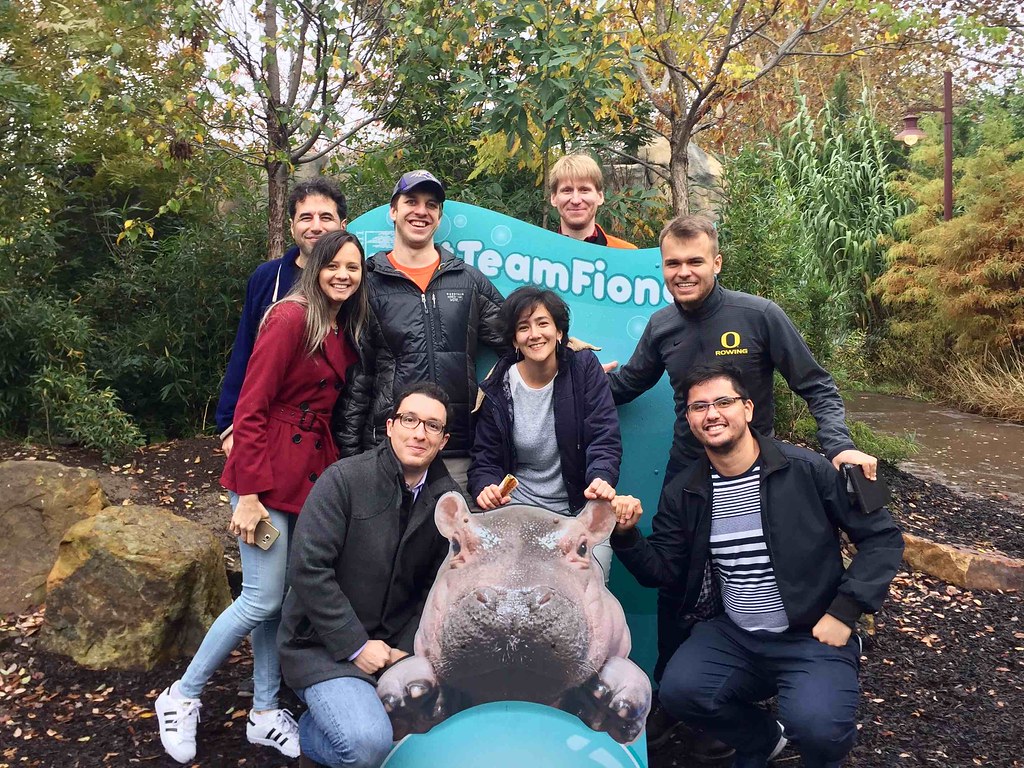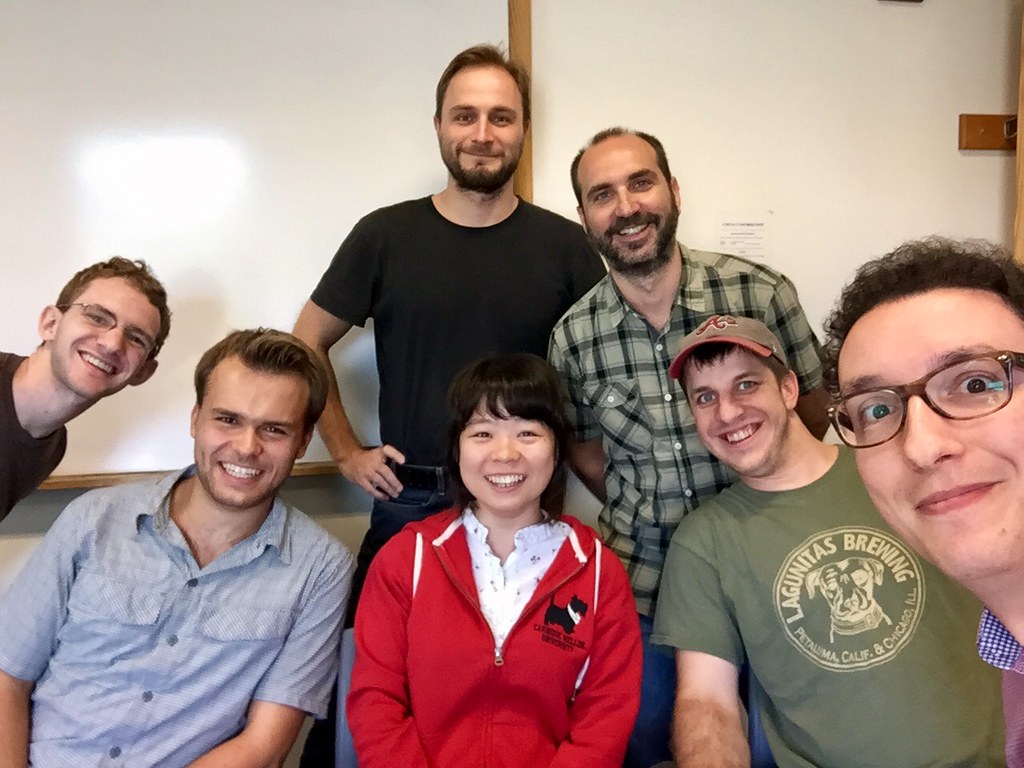STRUDEL Reading Group updates
Wednesday, Sep 5, 2019
Okok, Sophie’s back on track recording our reading group discussions. We have a new member this year - Hongbo Fang. It is our tradition to welcome new people by asking them to present a paper. Here’s Hongbo’s summary about the paper he presented: Hongbo FAng presented the paper “What Makes Geeks Tick? A Study of STack Overflow Careers” (Xu et al., 2019). It tests a simple hypothesis that people will contribute more on StackOverflow when searching for a new job. Data shows that people’s reputation generating actions on StackOverflow decreases much more after a job change comparing to non-reputation generating actions, which imply that they invest extra energy to gain reputation on StackOverflow before having a new job. I particularly like how they systematically ruled out other plausible explanations, which strengthend their major argument and made the paper more convincing. It is also a good exmaple for learning how to proof causal relation in social context.
Although I imformed him about our good tradition of bringing snacks to the meeting, he unavoidably forgot about it. Thanks Ei Pa for keeping our good tradition by bringing chocolate she purchased in Denmark on her way to a conference. It looked like they came out from a fairy tale! I wish I had taken pictures of those heart-shaped ones.
Wednesday, July 25, 2018
So sad. Today was the last group meeting of the summer season. Thanks a lot to our REU students Sophie and Courtney for spending their summer with us. We appreciate your visit.
Here’s all of us wearing STRUDEL gear:


Wednesday, June 27, 2018
Our REU student Courtney volunteered to present the paper Do Programmers Work at Night or During the Weekend (Claes et al., ICSE, 2018). Being a college freshman, Courtney did a wonderful job presenting this paper. There are several different types of visualisation in this paper and we discussed their merits and defects. Hopefully Courtney would find these examples useful when she has to present her work.
Sophie brought a piece of raspberry dark chocolate and a piece of 92% dark chocolate. She presented the chocolate without any lable and left them to her lab mates to figure out.
Wednesday, June 20, 2018
David Widder presented the paper Prevalence of Confusing Code in Software Projects (Gopstein et al., MSR, 2018). I really like this paper especially the confusing code they presented in the paper. Honestly, I think some of them are fun to be kept in the code. They can sift out those who do not have solid background in the C language and keep only experts in the develop team. I do believe that projects like Linux require developers with C knowledge far beyond what one can learn from some online C tutorial or a single semester college course. However, I think it is also necessary to remove confusing code so that more people can get involved in the developing process. After all, more often than not, some pieces of code are excessively confusing, especially we now have the luxury to sacrifice disk space for code clarity.
David brought some brownies and Sophie brought some Chinese rice cake for the dragon boat festival.
Wednesday, May 23, 2018
After a few weeks’ practice talks done by several STRUDEL members, Sophie Qiu, yes, her again, presented the paper Newcomers’ Barriers. . . Is That All? An Analysis of Mentors’ and Newcomers’ Barriers in OSS Projects (Balali et al., CSCW, 2018). The paper identified several barriers that mentors are facing in open source software projects. There are many newly found barriers but I think some of them can be combined with or subsumed under some old ones; some need more details or real instances. I think the barriers that they had identified are important. However, I wish to see more practical and concrete solutions.
Wednesday, April 25, 2018
Sophie Qiu presented the freshly baked paper Competence-Confidence Gap: A Threat to Female Developers’ Contribution on GitHub (Wang et al., ICSE, 2018). The authors show that there is a Granger causality between female programmers’ raise of number of followers and their pull requests on GitHub. They claim that this is because the number of followers bridges women’s competence-confidence gap and reassures female programmer that their contribution will be welcomed and valuable. Although this sounds a potential solution to encourage women to make contributions to open source softwares, the paper did not mention how these woemn earned new followers in the first place. The only example vaguely mentioned was that the female programmer looked cute, which is in fact not an acknowledgement of her programming ability.
Wednesday, April 4, 2018
Alan Jaffe presented the paper Program Synthesis from Natural Language Using Recurrent Neural Networks (Lin et al., UW-CSE, 2017). We often say there are two major coding styles: stackoverflow oriented programming and google oriented programming. The point it is making is that all the code we need are written, programmers only need to assemble them to make a executable program. I believe this can be easily replaced by machines and this paper is a proof.
Wednesday, March 28, 2018
Marat Valiet presented the paper Talent vs Luck: the role of randomness in success and failure. This paper is a cool example of using simulation to address real life problems. With a simple design they were able to model different funding policies and their outcome. The paper claims that in some setups with a large influence of luck, strategies based on random choices are more effective than traditional “naively meritocratic” models.
Somehow people had forgotten our good tradition of bringing snacks.
Wednesday, March 21, 2018
Bogdan Vasilescu presented the paper Was my contribution fairly reviewed?” A Framework to Study the Perception of Fairness in Modern Code Reviews (Yang, ICSE, 2018). In the paper, many different aspects of fairness are discussed, which was very inspiring.
Wednesday, Feburary 21, 2018
Jeremy Lacomis presented the paper How to Design a Program Repair Bot? Insights from the Repairnator Project (Urli et al. ICSE 2018).
It is interesting to learn about online program repair bugs. When I was talking with a CMU undergrad at one of KGB’s activity, he was excited to learn that people are working on how to fix bugs automatically since he has some very unpleasant experience with debugging - so do many of us. It would be great if we could have a bug repairing bot with high accuracy in the future. However, as Marat pointed out, when the debugging process can be largely substituted by a robot, that means this language is dying. One example is Assembly. Here’s a quote from Paul Graham about the evolution of programming languages:
“What programmers in a hundred years will be looking for, most of all, is a language where you can throw together an unbelievably inefficient version 1 of a program with the least possible effort. At least, that’s how we’d describe it in present-day terms. What they’ll say is that they want a language that’s easy to program in.
Inefficient software isn’t gross. What’s gross is a language that makes programmers do needless work. Wasting programmer time is the true inefficiency, not wasting machine time. This will become ever more clear as computers get faster.” (source: http://www.paulgraham.com/hundred.html)
Wednesday, Feburary 14, 2018
Jason Yanwen Lin presented the paper Predicting Member Productivity and Withdrawal from Pre-Joining Attachments in Online Production Groups (Yu et al. CSCW 17).
This paper analysed withdrawl from Wikipedia groups using the attachment theories from social psychology. There results show that pre-joining connections are important to online production groups. Speaking from my personal experience, I totally agree with the authors. Especially in online community, when you often interact with people who you don’t konw much personal information, it can be hard to form attachment.
Wednesday, Feburary 7, 2018
Shurui Zhou presented the paper Almost There: A Study on Quasi-Contributors in Open-Source Software Projects (Steinmarcher et al., ICSE 2018).
It was interesting to learn that many people stopped making further contribution on GitHub after their first pull request was rejected. We also felt that there would be many future work worth pursuing. Thanks Shurui’s presentation as well as her snacks.
Since it was Alex’s meeting before he became a professor in Estonia, he also brought some pastries from Gates. We appreciated his intention of getting us fat. We will miss you.
By the way, I think Gates’ blueberry muffin is very nice, as well as banana & nuts in Scott. Nevertheless, no muffin compares to thos in Brown’s Blue Room or banana muffin at Corner Bakery Cafe.
Wednesday, Janurary 14, 2018
David Widder presented the paper Open Source barriers to entry, revisited: A tools perspective (Mendez et al. ICSE 2018).
Professor Margaret Burnett’s team has been studying GitHub’s gender inclusive issues. Since men and women are biologically different statistically, tools should be designed to cater their different ways of thinking and engaging with software. I do not think software developing is an inheritly male dominated task. I believe that getting more women into software developing is a key to gender equality. Yes, I am a feminist.
Davis is very good at baking, but I think he should have given out his delicious brownies at the beginning of his presentation rather than at the end.
Thusday, December 5, 2017
Sophie Qiu presented the paper The influence of visual feedback and gender dynamics on performance, perception and communication strategies in CSCW (Koulouri et al. International Journal of Human-Computer Studies 2017).
This paper shows that while men are statistically better at navigation with help from visual signals, women can use verbal communication to compensate such weakness and achieve the same level of excellency in navitation tasks. GenderMag, which David Widder will present later, is in the same mindset that although men and women are statistically biologically different, well-designed tools can help both of them succeed.
Sophie did not know that green been pie could contain cream so she bought a lot of them. Luckily, she could bring them to Strudel meetings so that everyone can eat them and be merry.
Tuesday, November 28, 2017
Bogdan Vasilescu presented the paper Code Coverage and Postrelease Defects: A Large-Scale Study on Open Source Projects (Kochhar et al. 2017).
This paper shows that code coverage in testing has insignificant correlation with the number of bugs at the project level of a software. Then my question was: how much test would be sufficient if a large software project could never be bug-free?
I do not remember what snack we had during that meeting.
Tuesday, November 21, 2017
Shurui Zhou presented the paper Some from here, some from there: cross-project code reuse in GitHub (Gharehyazie et al., MSR 2017).
This paper reminds me of two most popular ways of coding: Google-oriented coding and stackoverflow-oriented coding. It is expensive to write code from scratch, so understanding how code pieces are cloned across projects is useful.
I do not quite remember the snack but it might be Shurui’s Choco Pie.
Tuesday, November 14, 2017
Alexander Nolte presented the paper Flash Organizations: Crowdsourcing Complex Work by Structuring Crowds As Organizations.
It is a nice paper on how to more effectively form an software developing group. It was good to read some paper on HCI, which I was fascinated in but knew very little about.
Thanks for your cookies, Alex. I guess they came from La Prima Espresso in WEAN.
Tuesday, November 7, 2017
Alan Jaffe presented the paper Automatically Generating Commit Messages from Diffs Using Neural Machine Translation (Jiang et al., ASE 2017).
It is an interesting application of the naturalness of code. I learned a lot about the idea of naturalness of code, as well as the fact that Alan is very good at baking pumpkin pies.
Tuesday, October 31, 2017
No meeting this week. STRUDEL was away attending ASE in Urbana-Champaign, IL and visiting Fiona at the Cincinnati Zoo. #teamfiona

Tuesday, October 24, 2017
STRUDEL was proud to host Alexander Serebrenik from TU Eindhoven, who talked about his recent work on mining emotions from software engineering artifacts. We were all enjoying his talk as well as Sophie’s hazelnut wafel.

Tuesday, October 17, 2017
Sophie presented the paper Simultaneously Uncovering the Patterns of Brain Regions Involved in Different Story Reading Subprocesses (Wehbe et al., PLoS ONE 2014).
The researchers scanned participants brains while they were reading the ninth chapter of Harry Potter and the Sorcerer’s Stone. They then trained a classifier that can distinguish which short passage the participants were reading based on the neural activity. The choice of this paper was to present group members another machine learning classifier that can process fMRI results. It was very nice and sweet that David made apple raisin strudels.

Tuesday, October 10, 2017
Marat presented the paper Romantic partnerships and the dispersion of social ties: a network analysis of relationship status on facebook (Backstrom et al, CSCW 2014).
This paper proposed to use dispersion, which measures “the extent to which two people’s mutual friends are not themselves well-connected,” in addition to embeddedness, which measures the number of mutural friends, to predict if two Facebook users are in a romantic relationship. The accuracy of prediction increased significantly when using the dispersion metric. Somehow, my impression of the paper smells like homemade banana bread.
Tuesday, October 3, 2017
David presented the paper Automatically Diagnosing and Repairing Error Handling Bugs in C (Tian and Ray, ESEC/FSE 2017).
This paper presents how to identify different types of bugs and how to correct them in C/C++ code. Happy Mid-autumn festival and thanks Sophie for her mooncake!

Tuesday, September 26, 2017
Jeremy presented the paper Decoding the representation of code in the brain: An fMRI study of code review and expertise (Floyd et al, ICSE 2017).
The researchers scanned participants’ brain while they were reviewing code or prose. The findings suggest that reading code differs from reading natural language, but less so for experts than for novices.
Tuesday, September 19, 2017
We had our first reading group meeting today! To celebrate, Bogdan brought apple-cinnamon strudels for us. Nevertheless, these strudles were not as good as our discussion on the paper Fairness Testing: Testing Software for Discrimination (Galhotra et al, ESEC/FSE 2017) that Bogdan presented at the meeting.

Subscribe
Subscribe to this blog via RSS.
Categories
Blog 3
Reu 1
Announcement 10
Research 1
Travel 1
Social 1
Cmu 1
Recent Posts
-

Infographic: Understanding Toxicity in Open Source Discussions
Posted on 28 Apr 2022 -
 Posted on 01 Jul 2021
Posted on 01 Jul 2021
-
 Posted on 18 Jun 2020
Posted on 18 Jun 2020
-
 Posted on 03 Feb 2019
Posted on 03 Feb 2019
Popular Tags
Blog (3) Web-design (1) Reu (1) Announcement (10) Research (1) Reading-group (1) Travel (1) Social (1) Cmu (1)